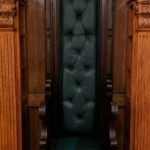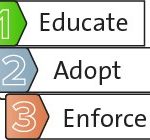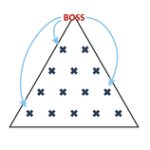ground rules for meetings
Updated November 19, 2022 Second the motion—everybody knows how to do that, right? Well, in fact there are some funny ideas floating around about this ordinary act of meeting procedure. Let’s unravel the mysteries. Second the motion—why? Robert’s Rules of Order Newly Revised, 12th edition, says that a person seconds a motion in order to…
Confusion about the role of the chair at meetings can be widespread. Here are some parameters. Download PDF Chair of large meeting does not discuss and vote When a large assembly (group) is meeting, the chair serves as a facilitator. The chair does not take part in debate (discussion) and does not vote, unless the…
A reader writes, “The city council has never used much parliamentary procedure in our meetings. People speak when they want and sidebar discussions are common. How to ease the council into more parliamentary procedure without confusing them?” It’s a great question. Here are three steps you can take to get your council or board to…
When you are considering the rights of ordinary members at nonprofit board meetings, first look to your state statutes. This is usually easy to do online. Start by reading the plain language text of the laws of the state in which your organization is incorporated. (For complex matters of interpretation, of course you will consult…
In our view, the motions Point of Order and Appeal are the heart of our democracy. They provide the mechanism to stop a dictatorial chair who is acting like a “boss.” They are essential for every local government body, nonprofit board, and any group that functions on democratic principles. Learn how to use them to ensure…
Robert’s Rules of Order includes four fundamental guidelines that will create successful meetings. They are easy to say but take some effort to apply, since prevailing culture is often very different. Run your meetings according to these guidelines so your meetings—and your organization—will flourish. Download PDF I. The person running the meeting is the servant of…
It is a little-known fact that ultimately it is the board that is in charge of your meeting, not the chair. According to the principles of parliamentary procedure and Robert’s Rules of Order, the chair runs the meeting while subject to the will of the body as a whole. This is very different from the…
David Rumsey, past president of the American Translators Association, offers thoughts for the holiday season in this guest post.
High drama in the House of Commons as Member of Parliament expelled for the day.
Jurassic Parliament strongly recommends that local governments establish a policy requiring elected officials to put away their cell phones while on the dais.











